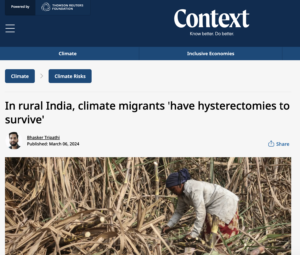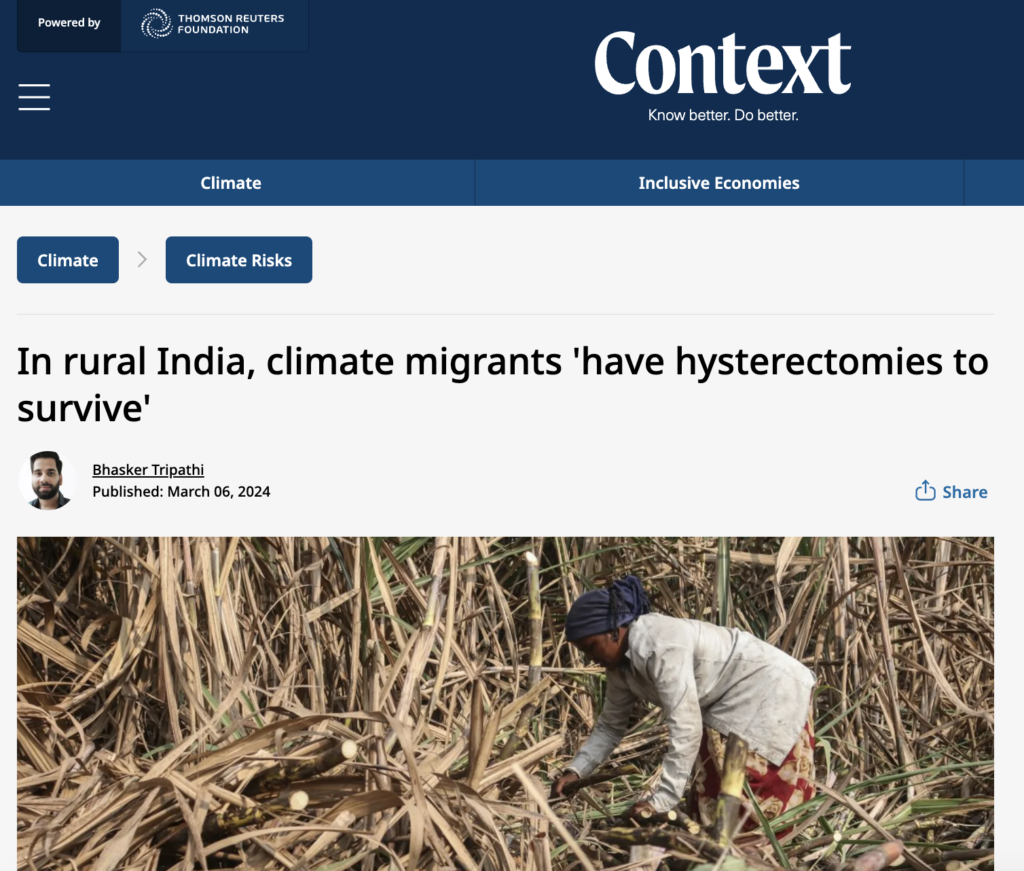By Bhasker Tripathi – Thomson Reuters Foundation
Excerpt: As climate change impacts hit farming, women driven into gruelling sugarcane work have the procedure to work harder, report says
- Frequent droughts push poor rural families to migrate
- Many work as labourers on Maharashtra sugar plantations
- Hysterectomy rates found far higher among migrant workers
NEW DELHI – Drought is driving poor Indian women into exploitative sugarcane work in the central state of Maharashtra, with many of the migrant labourers opting to undergo unnecessary hysterectomies to work even harder, research showed on Thursday.
Years of failed monsoons, extreme heat and droughts have led residents of Beed, a district in the top sugar-producing state to leave and become day labourers on sugar plantations, said the report by the International Institute for Environment and Development (IIED), a London-based think-tank.
The research found that more than half of the Beed women who had gone to work on sugar estates had undergone surgery to remove their uteruses compared with less than a fifth from households that had stayed in the district.
“Contractors cutting one- or two-days wage for missing work causes women to feel they have no choice but to have their wombs removed so their periods or pregnancy don’t prevent them from working,” said Ritu Bharadwaj, a principal researcher with the IIED and lead author of the paper.
“Hysterectomies are a symptom of economic distress in the region that is exacerbated by the climate crisis,” she added, saying the findings underscored the far-reaching – and hard to quantify – loss and damage caused by climate change.
Rising heat and extreme weather fuelled by climate change are battering subsistence farmers in India and elsewhere, leading to more frequent crop failures that drive people to migrate in search of work.
…
Scared of seeing their meagre income dwindle and with no bathroom facilities available, many of the women seek hysterectomies at private clinics, the research found, adding that they were often unaware of the potential health risks.
Back and joint pain, osteoporosis, pelvic discomfort and mental health issues were among the common health problems reported by women who have undergone the procedure, said Bharadwaj.
“We spoke to 20–25-year-old women who were experiencing menopausal symptoms after undergoing hysterectomies,” she added.
…
He said that women often faced “indirect pressure” from their employers.
Following media reports – including a Thomson Reuters Foundation investigation – about a surge in hysterectomies, Beed’s district administration said in 2019 that private hospitals would need its permission to perform the procedure.
But IIED researchers found many women were now simply going to private hospitals in adjacent districts.
#
Thomson Reuters Foundation: As climate change impacts hit farming, women driven into gruelling sugarcane work have the procedure to work harder, report says
Frequent droughts push poor rural families to migrate
Many work as labourers on Maharashtra sugar plantations
Hysterectomy rates found far higher among migrant workers
Drought is driving poor Indian women into exploitative sugarcane work in the central state of Maharashtra, with many of the migrant labourers opting to undergo unnecessary hysterectomies to work even harder, research showed on Thursday. Years of failed monsoons, extreme heat and droughts have led residents of Beed, a district in the top sugar-producing state to leave and become day labourers on sugar plantations, said the report by the International Institute for Environment and Development (IIED), a London-based think-tank… Ritu Bharadwaj, a principal researcher with the IIED and lead author of the paper: “Hysterectomies are a symptom of economic distress in the region that is exacerbated by the climate crisis.” … As climate change impacts hit farming, women driven into gruelling sugarcane work have the procedure to work harder, the report says.





